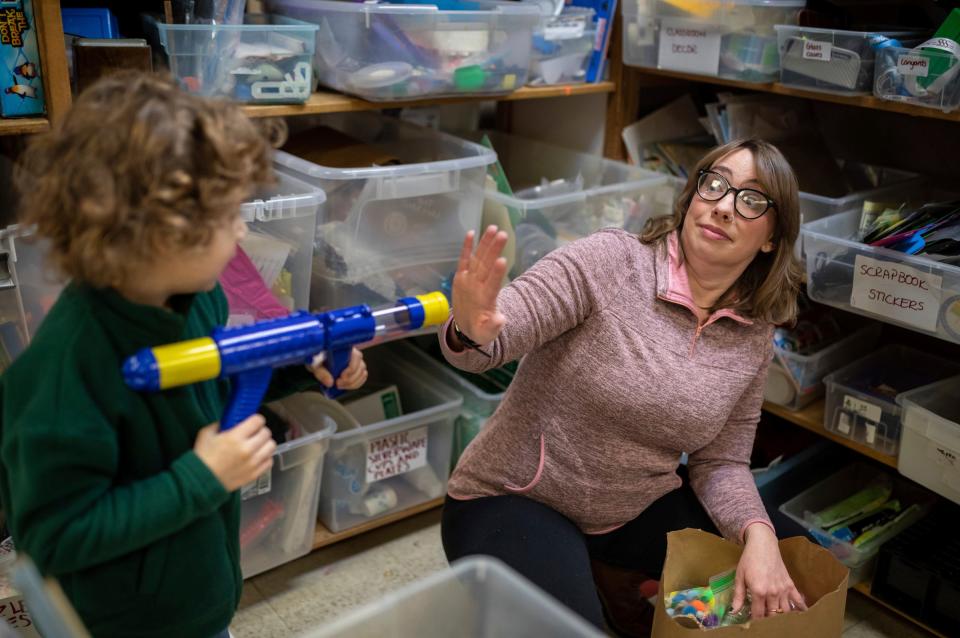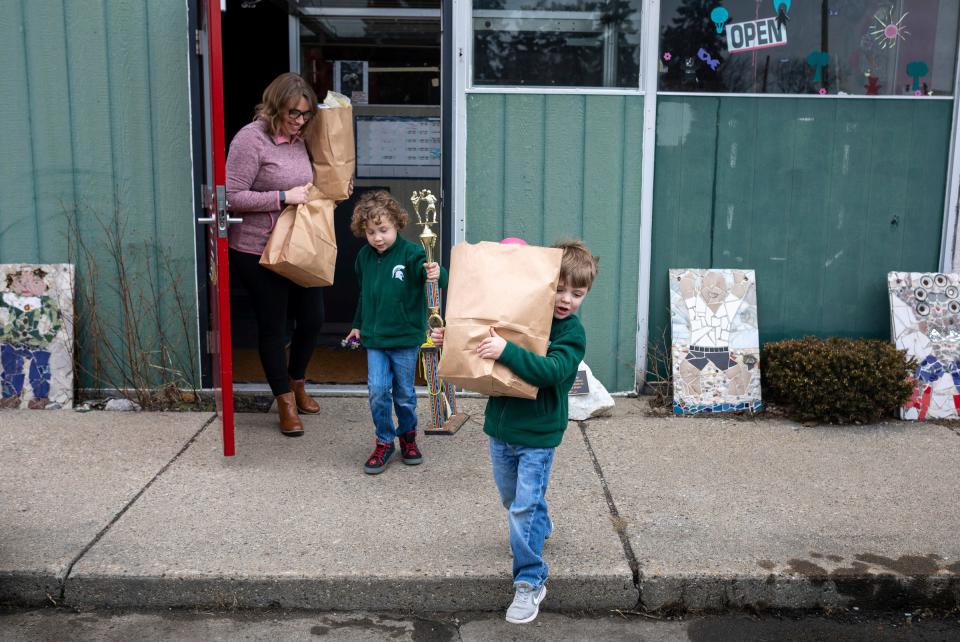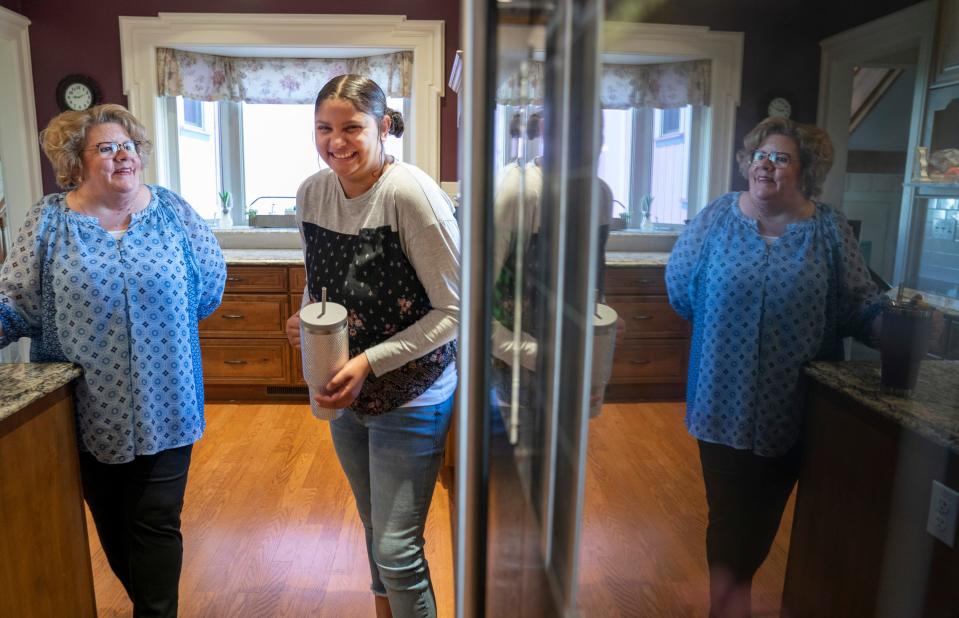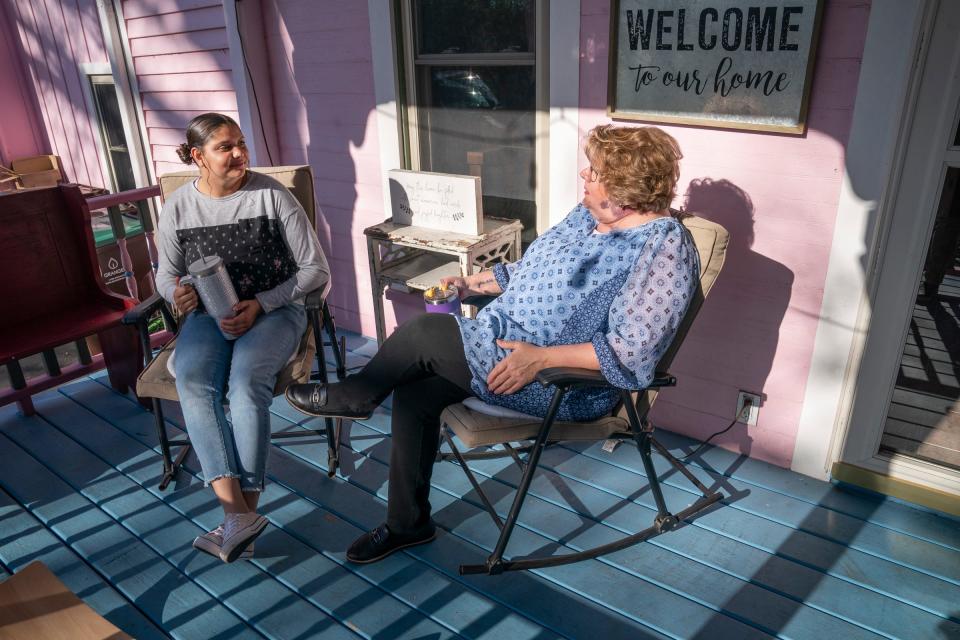Adoptive parents often learn the hard way: It takes more than love to overcome trauma
There’s a reason April Beaton has a 6-foot white beanbag in the living room and not a coffee table; a reason her 5-year-old son’s bedroom is kept bare. There’s a reason she keeps a stack of printouts of the chart she found that shows the overlapping behaviors of children with nine different mental health diagnoses; she hands them out to teachers, doctors, other parents and whoever else needs to understand why her son might cry every time he’s dropped off at school and panic that no one will pick him up, freak out when the schedule changes, throw things and run in circles.
It's because although Beaton became the foster parent of her two now-adopted sons at birth, their minds and behaviors were shaped by early childhood trauma. The insult of being exposed to alcohol and who-knows-what-else in the womb, sure.
But just as relevant for the way her kindergartner might have a meltdown in the grocery store is the fact that he experienced a traumatic experience most of society views as a happy ending: going through adoption at all.

“When we're thinking about adoption from foster care, we know that there has been significant relational attachment-system trauma for those kids, even if it was in utero, or in infancy,” said Jessica Sinarski, an author and clinical supervisor with nearly 20 years of experience in child welfare.
That early childhood trauma affects kids on a physiological level. It can cause a child to remain detached from a caregiver. Or cling to them. Or, in some circumstances, it can cause dangerous behavior: severe emotional disturbances that result in them setting fire to the house, beating up siblings, smashing windows, attempting suicide.
“These big behaviors are coming from a brain in protection mode that doesn't know how to get the help it needs,” Sinarski said.
The thing is, foster and adoptive parents are largely unaware of just how tough it might be — emotionally and financially — to raise a child with a trauma background.
For families who adopt out of the child welfare system, finally signing the paperwork that turns a kid into a son or daughter can be beautiful, fulfilling and rewarding for everyone. It can also be the beginning of a long and challenging journey. One for which most families say they were never prepared.
Trauma creates a blueprint for children’s brains
Children’s brains develop at an astronomically fast rate. From birth to 3 years old, 1 million neural connections are being formed every second. And when children’s brains are forming those pathways in an environment of stress, insecurity or neglect, they can get wired to expect and survive those conditions in perpetuity.
“We have this naive notion that a child is a passive recipient of experiences; the brain sits there just waiting for experiences to happen,” said Dr. Charles Nelson III, professor of pediatrics at Harvard Medical School. “But it's an interaction. So, when experience changes the brain, the brain then interacts with the world differently.”
The separation from a biological parent is an adverse childhood experience that can create brain differences and change how a child feels, thinks, develops and acts. And kids who were adopted out of foster care even at a very young age can exhibit behavioral issues that are often misdiagnosed and misunderstood.
“It's trauma, it's prenatal drug exposure. It's prenatal alcohol exposure, it’s ADHD. It is a developmental delay. All of those are brain damage. And they're all competing with each other,” said Beaton. “So what causes it? How do you move forward from it? I don't think you ever know.”
Adoptive parents aren't prepared to take on trauma
If anyone was equipped to take in a foster child for adoption, it was Ben and Andi Kraker. Andi had worked in foster care licensing and did a lot of training for new foster parents. By the time the Krakers moved to Michigan, they already had one adopted child of their own.
When they decided to foster the 8-year-old girl who would become their daughter, she had one failed adoption under her belt. The couple knew they were in for a challenge. But they still couldn’t conceive of the wild ride parenting her would be.
“You get a kid like that, (with serious trauma) and it really is going to impact every area of your life and you have to be ready for them,” Andi Kraker said. “And I think people just don't get that.”
The Krakers were far from the only adoptive parents who felt the training they received was inadequate.
Kathalina Goneia had already worked as a social worker for 14 years before adopting her daughter out of the child welfare system and said both the foster care training and the state-provided induction training were a joke.
“Worse than a joke,” Goneai said. “I wanted to stand up and say, 'Oh my God, you guys have got it all wrong.' ”
Beaton went through the training more recently and said it had improved by including information about the trauma created from family separation. But she still said she didn’t really know what she was getting into, and the lasting behavioral and developmental effects of trauma and fetal alcohol syndrome were not made clear.

Then again, she’s not sure it would have made a difference. Many parents go into fostering and adoption with blinders on, she said, hoping for the best.
“We have a long way to go as far as helping parents understand what's really going on and what's needed and that it's not going to be a rainbows and unicorns experience,” Sinarski said.
Brains can change, and so can parents
Most adoptive parents feel incredibly alone, according to parenting expert, therapist and author Kim Seidel, who trains parents around the state who are raising what she calls ‘aliens’ — children who have experienced trauma and whose brains have wired accordingly.
She teaches them how to parent in a way that reestablishes that sense of security, love and attachment, even though it may run completely counter to how they think they should parent or how they were raised.
Research on early childhood trauma continues to pile up, revealing its impact on long-term physical and mental health. But so, too, does research on brain plasticity, showing us that even brains wired to survive adversity have the capacity for retooling themselves in new environments.
“You are redrawing a blueprint,” Seidel said. “You are filling in some empty spaces, empty lines, you’re erasing some parts and creating a whole new system.”
‘Superheroes are born from adversity’
Looking at 21-year-old Audrey today it would be hard to imagine her choking a kid on the playground, cycling in and out of psychiatric units or being held against the wall by her adoptive mother until the cops could arrive.
She was born addicted to drugs — in worse condition than her twin sister — and spent the first two weeks of her life with her biological mother before being removed and put in foster care. Audrey grew up struggling to manage her bipolar disorder, depression, ADHD and other mood disorders along with the feelings of anger and abandonment that plagued her as a tween and teenager.

Janet Sanford at times wanted to give up on her adopted daughter. The time Audrey punched the secretary at the Christian school where Sanford works, for instance. The time Audrey called her every name under the sun in a fit of rage when kids weren’t following the rules on the basketball court.
Audrey knew every police officer who worked in Summit Township. By the time she was finishing high school, they’d all talked her off the metaphorical ledge at some point or another.
“At some point, we’re going to break,” Sanford thought.
But Sanford knew that in a very real way, Audrey’s life depended on her. She couldn’t give up on her daughter.
“You have to learn to advocate and advocate and advocate and go crying to your bed and get up the next day, even though you wanted to quit yesterday, and you’ve got to keep going,” Sanford said.
Over time, Sanford was able to get Audrey what she needed. She found a pediatric mental health professional who clicked with Audrey, who has been seeing her now for 11 years. They finally found the right mix and levels of medication.
She planted positive, female role models and mentors in her daughter’s life who would be friends to her even when her depression and behavior made friendship a tough sell. “I needed people to love her,” Sanford said. “And I needed people to love her when I was struggling to love her.”

Sanford has been fostering children for 29 years. She has had 223 kids come through her home and has adopted 10 of them. Sanford didn’t have a parent coach to call when she started, but now she is one for Jackson County. She tells prospective foster and adoptive parents to expect to cry.
Audrey is successful, by any account. She holds down a job at a child care center and says she doesn’t have to be a broken person, defined by her background. She’d like to be a mother one day.
“I say often that superheroes are born from adversity,” said Sinarski, the author and experienced clinical supervisor. They are exposed to great hardship and challenge, but somebody comes along offering a safe and secure relationship that changes their trajectory. “That relationship can be powerfully healing.”
Jennifer Brookland covers child welfare for the Detroit Free Press. This story was produced with support from The Dart Center for Journalism and Trauma at Columbia University.
This article originally appeared on Detroit Free Press: Early childhood trauma rewires the brain and parenting must adapt too

